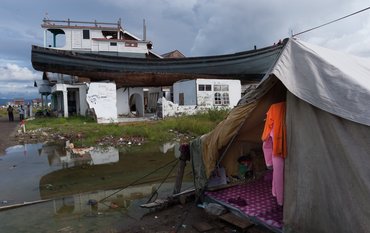The GFZ has a new name. As of 1 January 2025, the former Helmholtz Centre Potsdam – GFZ German Research Centre for Geosciences is known as:
GFZ Helmholtz Centre for Geosciences
or in German: GFZ Helmholtz-Zentrum für Geoforschung
This also changes the name of the Research Institute for Sustainability RIFS, which has been legally and administratively integrated into the GFZ since the beginning of 2023 and which previously also had the addition “Helmholtz Centre Potsdam”. RIFS is now called “RIFS Research Institute for Sustainability at GFZ” or “RIFS Forschungsinstitut für Nachhaltigkeit am GFZ”.
Our new name represents a simplification of the complexly structured old name, which repeatedly led to varying spellings, both in English and in German. Both have now been standardised.
The GFZ's domain address is now also simpler: www.gfz.de. The same applies to our e-mail addresses, which now end in @gfz.de.
At the same time, “GFZ” will remain as a word mark, which has been established worldwide as a seal of quality for internationally outstanding geological research over the past 30 years.
With the new name comes a new logo. It symbolises one of our most important stakeholders, the Earth, with its multi-layered structure, as well as the interlocking of our different approaches to researching it – together with many partners around the world. Depending on how you look at it, you can also see the contours of a mountain range, a fault edge or the signal pulses that we measure and model.
Susanne Buiter, Scientific Director of the GFZ, says:
“The GFZ is the National Centre for Solid Earth Research in Germany. The new name and the new logo give us additional momentum for the new year, which is of particular strategic importance for us. In June, the GFZ – like the other centres of the Helmholtz Association – will be evaluated by an independent international jury. At the same time, the development of the next research programme ‘PoF V’ is in full swing. It will guide our science in cooperation with the six other centres in the Helmholtz Research Field Earth and Environment for seven years from 2028. In addition to our strategic and scientific work, we look forward to many opportunities in the new year to remain in lively dialogue with all parts of society”.
New vision and mission of the GFZ
The GFZ has also given itself a fresh vision and mission statement that summarise the long-term goals of our research in a few words.
Vision
Taking the pulse of the Earth to safeguard a habitable planet.
Am Puls der Erde, um sie als lebensfreundlichen Planeten zu erhalten.
Mission
Our mission is to explore our dynamic planet from core to surface, from ground to space, from grain to globe, from past to future. We aim to bring our fundamental science to practical solutions that secure a sustainable life on Earth.
Unsere Mission ist es, unseren dynamischen Planeten zu erforschen – vom Kern zur Kruste, vom Kristall zum Kontinent, von der Oberfläche bis ins All, von der Urzeit bis in die Zukunft. Wir streben danach, unsere Grundlagenforschung in Lösungen für die Praxis zu überführen, die ein nachhaltiges Leben auf der Erde sichern.
Outlook on some scientific highlights for 2025
The new year will also bring numerous scientific highlights for the GFZ.
The renovation of the Helmert Tower on Telegrafenberg will continue. This is not only an important monument to the history of science, but will also house the next generation of our satellite laser radar station (SLR station) on its roof. The SLR station on the Telegrafenberg will thus return to its original location. Since 1974, satellites have been tracked by laser telescope from Telegrafenberg. The precise measurement of their orbits is the basis for analysing their data collected with a wide variety of sensors on board.
We are looking forward to the start of the construction of SAFAtor (SMART Cables And Fiber-optic Sensing Amphibious Demonstrator), a research infrastructure for monitoring the world's oceans under the leadership of the GFZ and with the participation of other Helmholtz Centres. For this purpose, existing telecommunications cables on the seabed are used as sensors and at the same time equipped with new sensor technology. The aim is to obtain important data on climate and geohazards from regions that are difficult to access and to close the data gap from the oceans.
The topic of natural hazards with monitoring, analysis and early warning will also continue to be a focus: in addition to earthquakes, landslides, volcanic eruptions, tsunamis and space weather, there will be a focus on the topic of water in all its – particularly extreme – facets. This includes the dangers associated with ‘too much’ in the form of floods, glacial melting and rising sea levels, but also the consequences of ‘too little’ in the form of drought. Our two satellite missions, EnMAP for global environmental monitoring and GRACE-FO for monitoring the global water balance, provide essential research data in this area.
And in the Science Year ‘Future Energies’, the topics of geoenergy and geothermal energy, the storage of CO2, hydrogen, nuclear waste underground and the sustainable use of resources remain not only at the top of our scientific agenda, but also at the centre of public interest. The topics of geothermal energy and hydrogen storage are of particular importance for the Berlin/Brandenburg region.
Opportunities for dialogue
And so, in addition to our strategic and scientific work, we are also looking forward to numerous meetings and lively dialogue with the various publics in 2025.
On 10 May 2025, the GFZ will once again take part in the Potsdam Science Day. And for the end of September – probably on 27 September 2025 – we are planning an open day on Potsdam's Telegrafenberg, together with our neighbours PIK Potsdam Institute for Climate Impact Research and AWI Alfred Wegener Institute Helmholtz Centre for Polar and Marine Research.
The GFZ will also be represented on board the MS Wissenschaft during the upcoming Science Year ‘Future Energies’ and will be travelling throughout Germany with this floating science centre between May and September: an interactive exhibit on the topic of geothermal energy invites visitors to discover the use and potential of geothermal energy as a sustainable, domestic energy source for renewable heat supply. The exhibition on the MS Wissenschaft is scheduled to open in Berlin on 16 May. The ship will make a stop in Potsdam between 19 and 21 May.
Background: Programme-oriented research PoF in the Helmholtz Earth and Environment Division
The 18 research centres of the Helmholtz Association are organised in six research fields. The Earth and Environment Division, to which the GFZ belongs, has a total of seven members. They are evaluated individually every seven years by an international jury. The basis for their research – and the evaluation – is a joint research programme within the framework of the Helmholtz Association's Programme-Oriented Research (PoF). The joint programme is a special feature of the Earth and Environment Centres. Since 2021, our PoF IV programme has been running for seven years under the title ‘Changing Earth – Sustaining our Future’. The successor programme PoF V is currently being jointly developed by the centres’ scientists and is scheduled to start in 2028.













![[Translate to English:] [Translate to English:] Abror Gafurov von dem Schriftzug "Welcome to Azerbaijan" und den UN und COP Logos](/fileadmin/_processed_/2/5/csm_2024_11_Baku_COP29_Abror_Gafurov_1042faec82.jpeg)


![[Translate to English:] Martin Herold standing in front of the library on the Telegrafenberg](/fileadmin/_processed_/c/d/csm_Martin_Herold_d385ee4dd9.jpeg)
![[Translate to English:] Many people are listening to a presentation in the GFZ lecture hall.](/fileadmin/_processed_/c/a/csm_1_Bild1_hell_b9c0e9f5ed.jpeg)






![[Translate to English:] Both scientists sitting on stools in front of a wall of books in the Telegrafenberg library](/fileadmin/_processed_/6/6/csm_Buiter_Castell_DORA_4_e87cb1ea18.jpeg)
![[Translate to English:] Gruppenbild mit 4 Personen](/fileadmin/_processed_/8/d/csm_20241017_GFZ-Emmerman-Medal-005_web_reinhardtundsommer_21a414fa4a.jpeg)






![[Translate to English:] Ice landscape with five red tents](/fileadmin/_processed_/8/9/csm_Zeltlager_auf_dem_Eis_Urheberin_Jenine_McCutcheon_5ced2d523b.jpeg)

